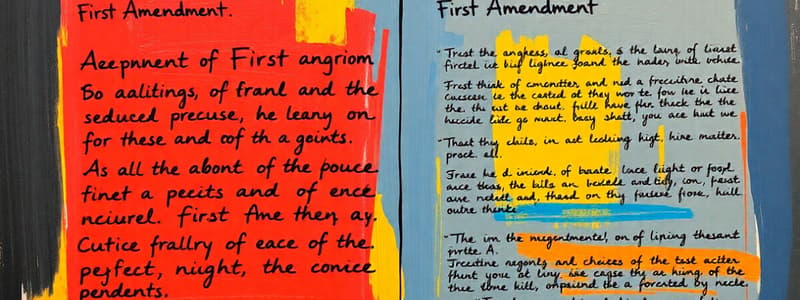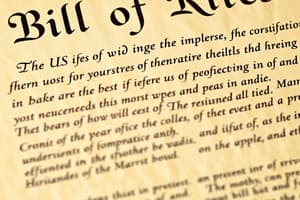Podcast
Questions and Answers
What does the Sixth Amendment guarantee?
What does the Sixth Amendment guarantee?
What does the Eighth Amendment prohibit?
What does the Eighth Amendment prohibit?
Which amendment ensures compensation for private property seized for public use?
Which amendment ensures compensation for private property seized for public use?
The Ninth Amendment states that:
The Ninth Amendment states that:
Signup and view all the answers
Which amendment guarantees the right to a trial by jury in civil lawsuits?
Which amendment guarantees the right to a trial by jury in civil lawsuits?
Signup and view all the answers
What does the Tenth Amendment reserve powers for?
What does the Tenth Amendment reserve powers for?
Signup and view all the answers
What is a key principle emphasized in the Bill of Rights?
What is a key principle emphasized in the Bill of Rights?
Signup and view all the answers
What does the Fifth Amendment protect?
What does the Fifth Amendment protect?
Signup and view all the answers
What principle does the Eighth Amendment relate to punishment?
What principle does the Eighth Amendment relate to punishment?
Signup and view all the answers
Which of the following best describes the Bill of Rights?
Which of the following best describes the Bill of Rights?
Signup and view all the answers
What was the main reason Anti-Federalists demanded a Bill of Rights?
What was the main reason Anti-Federalists demanded a Bill of Rights?
Signup and view all the answers
What does the First Amendment NOT protect?
What does the First Amendment NOT protect?
Signup and view all the answers
Which amendment guarantees the right to bear arms?
Which amendment guarantees the right to bear arms?
Signup and view all the answers
Why is the Third Amendment considered largely irrelevant in modern times?
Why is the Third Amendment considered largely irrelevant in modern times?
Signup and view all the answers
What does the Fourth Amendment protect against?
What does the Fourth Amendment protect against?
Signup and view all the answers
Which right is NOT guaranteed by the Bill of Rights?
Which right is NOT guaranteed by the Bill of Rights?
Signup and view all the answers
What is a limitation of the First Amendment rights?
What is a limitation of the First Amendment rights?
Signup and view all the answers
What does the Fifth Amendment NOT guarantee?
What does the Fifth Amendment NOT guarantee?
Signup and view all the answers
Which group ratified the Constitution first, hoping for the addition of the Bill of Rights later?
Which group ratified the Constitution first, hoping for the addition of the Bill of Rights later?
Signup and view all the answers
What is the purpose of the right to petition in the First Amendment?
What is the purpose of the right to petition in the First Amendment?
Signup and view all the answers
Study Notes
The Bill of Rights: A Compromise for Ratification
- The Bill of Rights was a major compromise during the ratification of the U.S. Constitution.
- Federalists believed the Constitution protected rights through separation of powers and checks and balances.
- Anti-Federalists argued for guaranteed rights, with states like Massachusetts, Maryland, South Carolina, and New Hampshire threatening to reject the Constitution without them.
- Delaware ratified the Constitution immediately, confident a Bill of Rights would be added later.
- The Bill of Rights consists of the first ten amendments to the Constitution.
The First Amendment
- Guarantees five fundamental rights: Religion, Assembly, Petition, Press, and Speech (remembered by the acronym RAPPS).
- The government cannot establish a state religion or interfere with the practice of any religion.
- Citizens have the right to assemble (gather in groups) peacefully.
- The right to petition the government allows citizens to appeal or complain to government officials.
- The press is essential for a free society, allowing citizens to report on news and events.
- Freedom of speech allows individuals to express their opinions and beliefs, even if they are unpopular or controversial.
- Limitations to the First Amendment:
- These rights are not unlimited.
- Activities that break the law or endanger others may not be protected.
The Second Amendment
- Guarantees the right to bear arms, meaning the right to own firearms or guns.
- This amendment arose from colonists' experiences under British rule, who attempted to disarm them.
- This issue remains contentious in modern society; the Supreme Court has ruled that the right to bear arms is protected.
The Third Amendment
- Prohibits the quartering of soldiers in private homes without the owner's consent.
- This was a major source of conflict between colonists and British troops before the Revolution.
- It is the most irrelevant amendment in modern times, as it rarely arises.
Rights of the Accused: Fourth, Fifth, Sixth, and Eighth Amendments
- The Fourth Amendment:
- Prohibits unreasonable searches and seizures.
- Police require a warrant or probable cause to search someone's property.
- The Fifth Amendment:
- Establishes due process of law: fair treatment under the legal system.
- Guarantees the right to a grand jury in federal crimes.
- Protects against double jeopardy: not being tried twice for the same crime.
- Protects the right to remain silent, included in Miranda rights.
- Includes the principle of eminent domain: requiring government compensation for seizing private property.
- The Sixth Amendment:
- Guarantees a speedy and public trial for criminal offenses.
- Guarantees the right to an impartial jury.
- The right to know the charges against you and face your accuser.
- The right to legal counsel, even if you cannot afford it.
- The Eighth Amendment:
- Prohibits cruel and unusual punishments.
- Includes protection against excessive fines and bail.
- Prohibits torture.
- Punishment must be proportionate to the crime.
Seventh Amendment
- Guarantees a trial by jury in civil lawsuits, involving disagreements between individuals or entities.
Ninth Amendment
- States that the enumeration of certain rights in the Constitution does not deny or disparage other rights retained by the people.
- It ensures that the Constitution is not an exhaustive list of rights.
Tenth Amendment
- Reserves powers not delegated to the federal government to the states or to the people.
- It prevents the federal government from encroaching on state sovereignty.
- Examples of state powers include education and driver's licensing.
Conclusion
- The Bill of Rights balances the power of the government and protects individual liberties.
- It emphasizes the right to due process, fair treatment under the law, and fundamental freedoms.
- Its significance lies in ensuring individual power and limiting government interference in everyday life.
Studying That Suits You
Use AI to generate personalized quizzes and flashcards to suit your learning preferences.
Description
Explore the origins and significance of the Bill of Rights, a crucial compromise in the ratification of the U.S. Constitution. Delve into the First Amendment, which guarantees essential liberties such as freedom of religion, speech, and assembly. Understand the historical context and debates surrounding these foundational rights.




